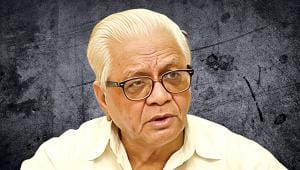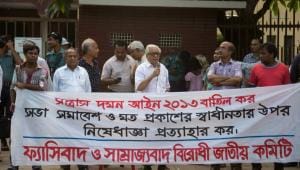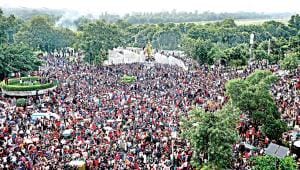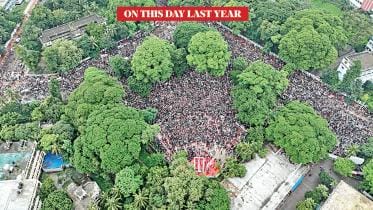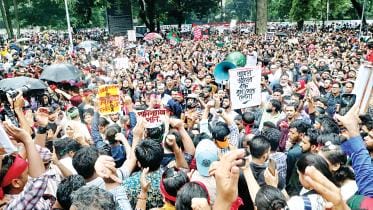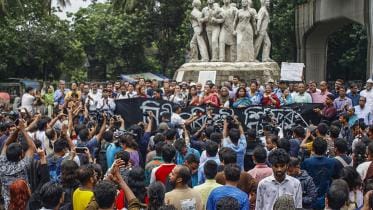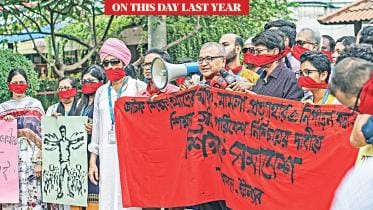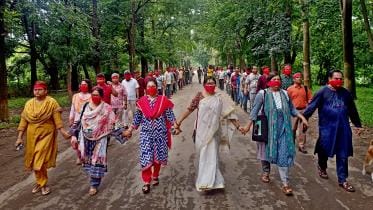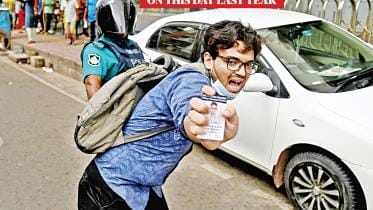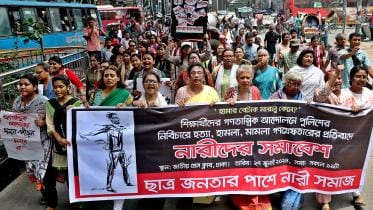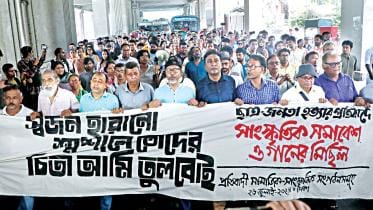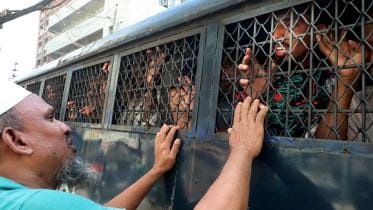‘The Fourth Estate will not survive unless defended’
Martin Moore and Thomas Colley, authors of Dictating Reality: The Global Battle to Control the News (2025), discuss how governments worldwide manipulate the media, reshape public perception, and construct competing realities in an age of digital disinformation. The interview was conducted by Shamsuddoza Sajen of The Daily Star.
2 November 2025, 05:00 AM
‘The Fourth Estate will not survive unless defended’
Martin Moore and Thomas Colley, authors of Dictating Reality: The Global Battle to Control the News (2025), discuss how governments worldwide manipulate the media, reshape public perception, and construct competing realities in an age of digital disinformation. The interview was conducted by Shamsuddoza Sajen of The Daily Star.
2 November 2025, 05:00 AM
Reading power: How everyday texts shaped life under the British Empire
At the heart of Required Reading are forgotten readers from the past.
28 October 2025, 10:46 AM
Whom will the Awami League supporters vote for?
The Awami League (AL) is very likely to haunt the entire exercise.
16 October 2025, 03:00 AM
A voice of resistance, progressive thought falls silent
Badruddin Umar, the eminent public intellectual, historian, and political activist, passed away in Dhaka yesterday at the age of 94. He breathed his last at Bangladesh Specialised Hospital, Shyamoli, around 10:05am. He was suffering from old-age complications.
7 September 2025, 18:10 PM
'We must not lose focus from real political barriers'
Hasina took dynasty politics to levels we could not have ever imagined. What happened to Sheikh Mujib’s former residence was unfortunate. But I would say that Sheikh Hasina is partly responsible for the incident.
7 September 2025, 08:22 AM
August 5, 2024: The day the people triumphed
August 5 became a watershed in Bangladesh’s history -- the climactic peak of the July uprising.
4 August 2025, 18:10 PM
August 4, 2024: The deadliest day of the uprising
August 4, 2024 marked the deadliest day of Bangladesh’s student-led uprising, as the non-cooperation movement entered an explosive new phase.
3 August 2025, 18:08 PM
August 03, 2024: A nation united under one demand
On August 3, 2024, the anti-discrimination movement in Bangladesh reached a new peak as protesters rejected prime minister Sheikh Hasina’s offer for dialogue and instead placed a singular, uncompromising demand before the nation: the resignation of the prime minister and her entire cabinet.
2 August 2025, 18:16 PM
August 2, 2024: Nationwide clashes as violence returns
After nearly two weeks of tense calm, Bangladesh once again plunged into violence on August 2, 2024, as widespread clashes broke out between protesters and police -- often aided by ruling party activists -- across multiple districts.
1 August 2025, 18:30 PM
August 1, 2024: Jamaat banned, protests surge, death toll mounts
The day marked a turning point in Bangladesh’s deepening political crisis, as the government officially banned Jamaat-e-Islami and all its affiliated organisations, including Islami Chhatra Shibir.
31 July 2025, 18:16 PM
July 31, 2024: Crackdown on march for justice
As the sun rose on July 31, 2024, thousands of students, teachers, and citizens across Bangladesh prepared to join the March for Justice, a countrywide programme organised by Students Against Discrimination.
30 July 2025, 18:04 PM
July 30, 2024: The red wave of defiance
Amid continued mourning and mounting outrage, July 30 marked a powerful day of nationwide protests and symbolic resistance, as students, teachers, guardians, and citizens rallied across Bangladesh demanding justice for the lives lost during the quota reform movement.
29 July 2025, 18:07 PM
July 29, 2024: Protesters return, undeterred
On July 29, 2024, the Awami League-led 14-party alliance recommended that the government ban Jamaat-e-Islami and its student wing, Islami Chhatra Shibir, citing their alleged involvement in anti-state activities.
28 July 2025, 18:09 PM
July 28, 2024: Crackdown worsens, thousands accused
By July 28, more than 2.13 lakh people—most of them unnamed—had been accused in nearly 200 cases filed with police stations across the capital in connection with the recent violence centring the quota reform movement.
27 July 2025, 18:08 PM
July 27, 2024: Mass arrests and block raids fuel fear
City residents, still reeling from the trauma of deaths and destruction during the quota reform protests, felt a renewed wave of fear. Each day, particularly after sundown, convoys of vehicles carrying law enforcers reached neighbourhoods across Dhaka.
26 July 2025, 18:10 PM
July 26, 2024: Crackdown deepens, grief grows
As Bangladesh reeled from days of unrest, the government intensified its crackdown. By 6:00pm on July 26, 2024, at least 738 more people had been arrested in the capital and several other districts in connection with the ongoing violence.
25 July 2025, 18:20 PM
July 25, 2024: A nation in grief and defiance
On July 25, 2024, two more individuals -- Zaman Mia, 19, a garment worker from Narsingdi, and Zakir Hossain, 29, a tailor shop employee from Rayerbagh --succumbed to their bullet wounds at Dhaka Medical College Hospital, according to hospital sources and their families.
24 July 2025, 18:46 PM
July 24, 2024: Tense calm, fresh arrests, lingering grief
At least 787 more people were arrested in the capital and other districts in the 36 hours leading up to 6:00pm on July 24, in connection with cases filed over violence across the country.
23 July 2025, 18:12 PM
July 23, 2024: Mass arrests and crackdown continue
On July 23, 2024, the government issued a circular radically overhauling the quota system in public service recruitment. According to the new directive, 93 percent of civil service positions would now be filled through merit-based recruitment, up from the previous 44 percent, while the remaining 7 percent would be reserved under various quotas.
22 July 2025, 19:29 PM




